Policy Papers
Between 2013 and 2019, we published various policy papers to initiate and advance the public discourse on globally relevant issues. Our starting point was to ask: what are the world’s most pressing problems, and how can we solve them?
Between 2013 and 2019, we published various policy papers to initiate and advance the public discourse on globally relevant issues. Our starting point was to ask: what are the world’s most pressing problems, and how can we solve them?

Despite the unprecedented economic and technological advances of the past decades, roughly one in ten people still live in
extreme poverty. This is one of the most urgent ethical problems of our time. Every year, Germany and Switzerland devote
billions to development cooperation in order to create opportunities for these people. However, results from scientific
research show that both countries finance extremely low-impact projects as well as highly effective ones. This paper
introduces the current state of empirical research on development cooperation and recommends potential solutions.
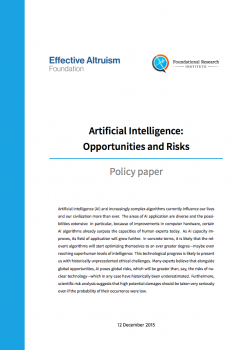
Artificial intelligence (AI) and increasingly complex algorithms currently influence our lives and our civilization more than ever. As AI capacity improves, its field of application will grow further. This technological progress is likely to present us with historically unprecedented ethical challenges. Many experts believe that alongside global opportunities, AI poses global risks, which will be greater than, say, the risks of nuclear technology. Furthermore, scientific risk analysis suggests that high potential damages should be taken very seriously even if the probability of their occurrence were low.
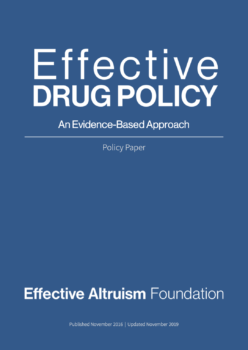
In contrast to many global crises, the war on drugs does not stem from technological limitations or scarce resources; rather, it
is the result of ideology and ill-devised policy. Because of its po- litical basis, drug prohibition and its negative consequences could be avoided if a new international drug policy were implemented. While political problems are not easier to solve than medical or technological ones per se, the global movement to reform drug policy has made considerable headway in recent years.
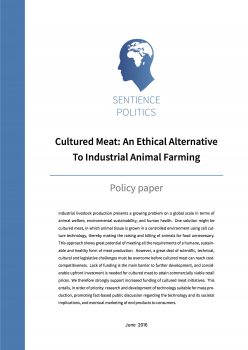
Industrial livestock production is a growing global problem for animal welfare, environmental sustainability, and human health. One solution could be cultured meat (also called "in vitro" or "clean" meat), for which animal tissue is grown in a controlled environment using cell culture technology. This could make the raising and killing of animals for meat obsolete. Cultured meat shows great potential as a humane, sustainable and healthy form of meat production.
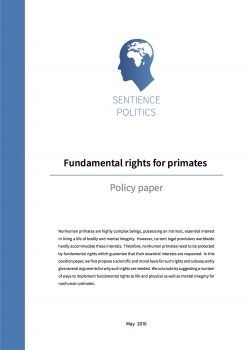
Nonhuman primates are highly complex beings, possessing intrinsic, essential interests in life and bodily and mental integrity. As current legal provisions around the world fail to accommodate these interests, we conclude that nonhuman primates should be granted fundamental rights, to guarantee that these essential interests are respected. In this paper, we propose a scientific and moral basis for such rights, and provide several arguments for why such rights are needed. We conclude by suggesting a number of ways to implement fundamental rights to life and physical as well as mental integrity for nonhuman primates.

In recent decades, society has become accustomed to a way of eating that promotes global warming, aggravates world hunger and water shortages, fails to ensure food security, harms our health, and violates Switzerland's constitutional principle of dignity for animals. As most of the problem stems from a high consumption of animal-derived foods, the solution will involve a shift towards plant-based eating.
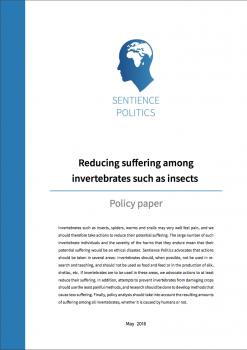
Invertebrates such as insects, spiders, worms and snails likely feel pain, so we should take action to prevent their suffering, as their large number and the severity of the harms they endure may mean that their current suffering amounts to an ethical disaster. We recommend actions that can and should be taken in several areas.
© 2026 Effective Altruism Foundation